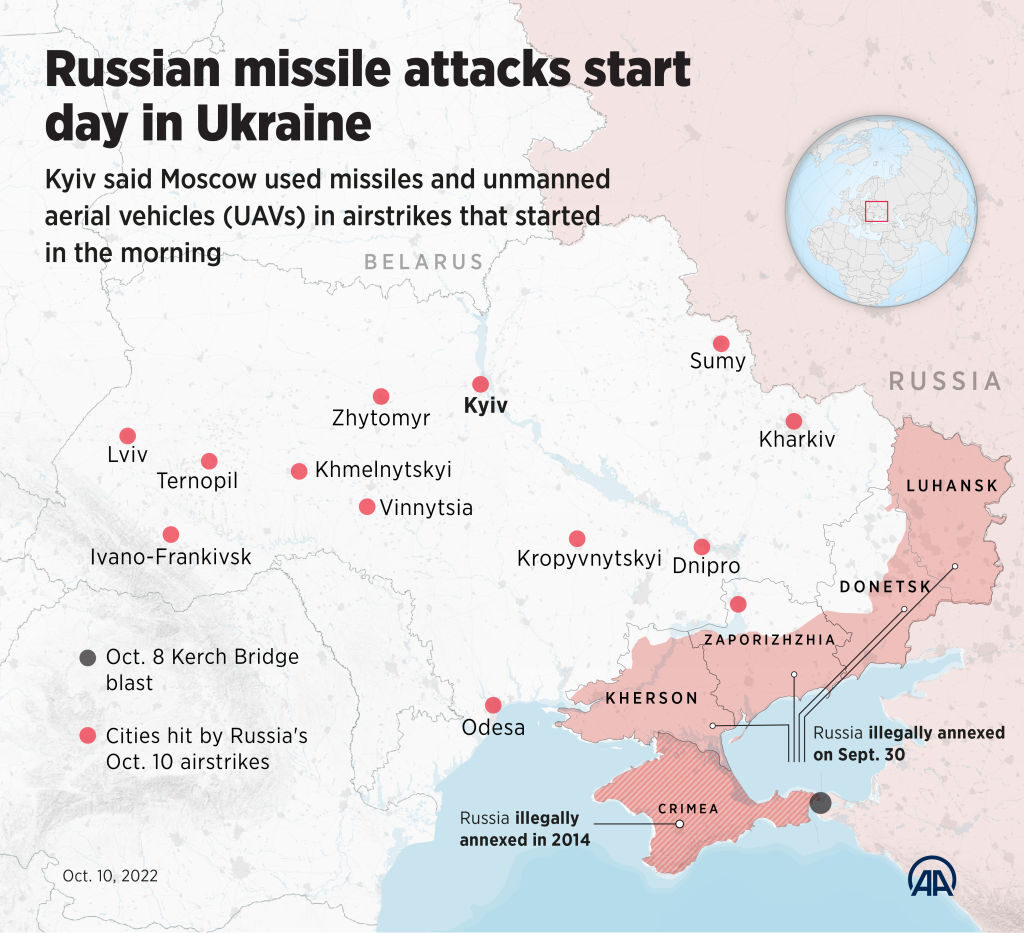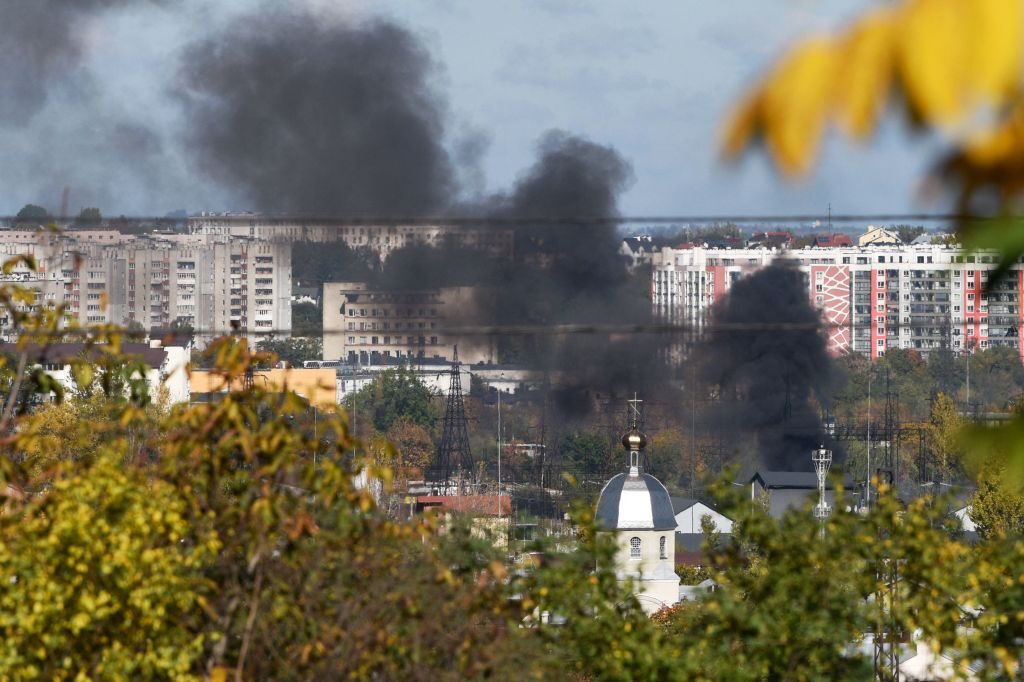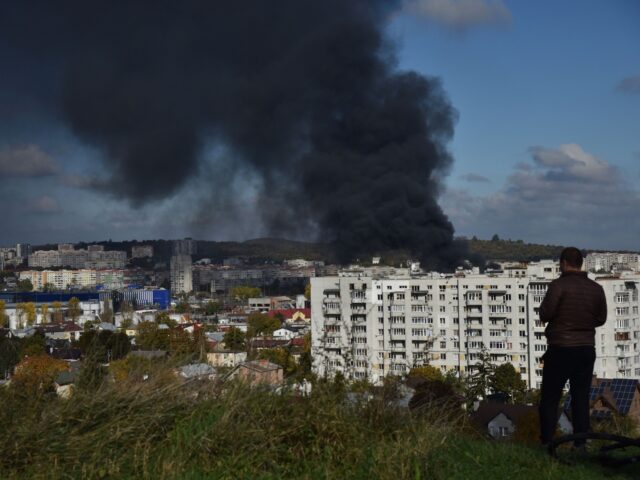The mayor of western Lviv, Ukraine, confirmed in a social media post on Tuesday that Russia had begun a missile assault, resulting in blackouts throughout the city of over half a million people.
The attacks on Lviv represent a dramatic expansion west for the Russian campaign against Ukraine, which had largely stalled in the eastern Donbass region for much of the summer. On Monday, Russian leader Vladimir Putin announced a “massive strike” against the Ukrainian government, first expanding in Kyiv, in response to a truck bombing on the Kerch Strait Bridge. The bridge connects occupied Crimea, Ukraine, to mainland Russia. Debuting in 2018, the 12-mile bridge prevents Ukrainian ships in the Sea of Azov from being able to pass into the Black Sea, severely damaging commerce in port cities Mariupol and Berdyansk.
The Ukrainian government has not officially taken responsibility for the bridge bombing, which Russia claims killed three civilians, but Ukrainian government accounts on social media openly celebrated the attack. No other individual or group has claimed responsibility for the bombing.
Lviv Mayor Andriy Sadovyi published a post on the social media application Telegram on Tuesday confirming Russian missile bombings on his city.
“Missile attack on a critical infrastructure facility in Lviv. Part of the city is again blacked out,” Sadovyi wrote, according to the Ukrainian state media site Ukrinform. The outlet claimed that Lviv residents are also experiencing hot water shortages as a result of damage to a “critical infrastructure facility.”

Kyiv said Moscow used missiles and unmanned aerial vehicles in airstrikes that started in the morning. (Elmurod Usubaliev/Anadolu Agency via Getty)
Reuters, also reporting on Sadovyi’s update, claimed about 30 percent of Lviv does not have power.
The Russian news agency Tass reported the same status of the city, stating that unspecified “explosions” had resulted in damage at two energy facilities serving Lviv.
Russia first invaded Ukraine in 2014, colonizing the Crimean peninsula and supporting two pro-Russian separatist groups in the Donbass that declared themselves the “people’s republics” of Donetsk and Luhansk. Putin “annexed” the two “people’s republics,” along with the Ukrainian regions of Kherson and Zaporizhzhia, in a ceremony in which he called for the “collapse” of the West in late September.
The war did not reach Lviv, about 40 miles from the Polish border, until March of this year, following Putin’s announcement of a “special operation” to “de-Nazify” Ukraine by overthrowing the administration of President Voloydymyr Zelensky, elected in a free and fair election in 2019. The Lviv attack caused particular alarm for humanitarian organizations as many of Ukraine’s refugees from war-torn eastern regions had traveled there seeking refuge. International media organizations also used the city as a safe base from which to report on the ongoing hostilities.
The Russian government does not challenge the legitimacy of the 2019 Ukrainian presidential election – in which Yanukovych’s successor, Petro Poroshenko, lost to the “pro-Russian” Zelensky – but claims that the ouster of pro-Russian former President Viktor Yanukovych was a “coup” and so every president following his departure is a dictator.
Russia’s attacks on Lviv began in March, targeting an airport and a location used to repair Ukrainian military aircraft. The strikes largely died down as the war refocused back east prior to this week.

Smoke rises above an Orthodox church in the western Ukrainian city of Lviv after Russian missile strike on October 10, 2022, amid Russian invasion of Ukraine. (YURIY DYACHYSHYN/AFP via Getty Images)
The Lviv bombings appear to be retaliation for the truck bomb on the Kerch Strait Bridge, which Russia claims did minimal damage to the structural integrity of the crossing. During a Russian Security Council meeting on Monday, Putin announced a major escalation in his bombing campaign against the Ukrainian government.
“This morning, at the proposal of the Defence Ministry and in accordance with the plan of Russia’s General Staff, a massive strike was launched with long-range precision air, sea and land-based weapons against Ukrainian energy, military and communications facilities,” Putin said, according to the official Kremlin translation of his remarks. “In the event of more attempts to stage terrorist attacks on our territory, Russia’s response will be harsh and commensurate with the threats posed to the Russian Federation. Nobody should have any doubts about that.”
Putin blamed the Ukrainian government for the bridge bombing, stating that Kyiv “has actually put itself on the same level as international terrorist groups, and with the most odious of those.”
The Russian Armed Forces formally confirmed the bombings throughout Ukraine intended to destroy its electric infrastructure on Tuesday.
“Today the Armed Forces of the Russian Federation continued to conduct massed strikes using high-precision, long-range air and sea-based weapons at military command and control facilities and the energy system of Ukraine,” Igor Konashenkov, a spokesman for the Defense Ministry, said, according to the Russian propaganda outlet Sputnik. “The goal of the strikes has been reached. All designated targets were hit.”
Sputnik claimed, citing Ukrainian media, that Russia launched over 200 missiles across the entire territory of Ukraine in the past 24 hours.
The targeting of electric infrastructure appears to have caused significant damage to Kyiv’s power network. Local officials reportedly announced “rolling blackouts,” Russian outlet RT claimed, in an attempt to ensure that the city will not deplete its total energy supply in the next week.

COMMENTS
Please let us know if you're having issues with commenting.